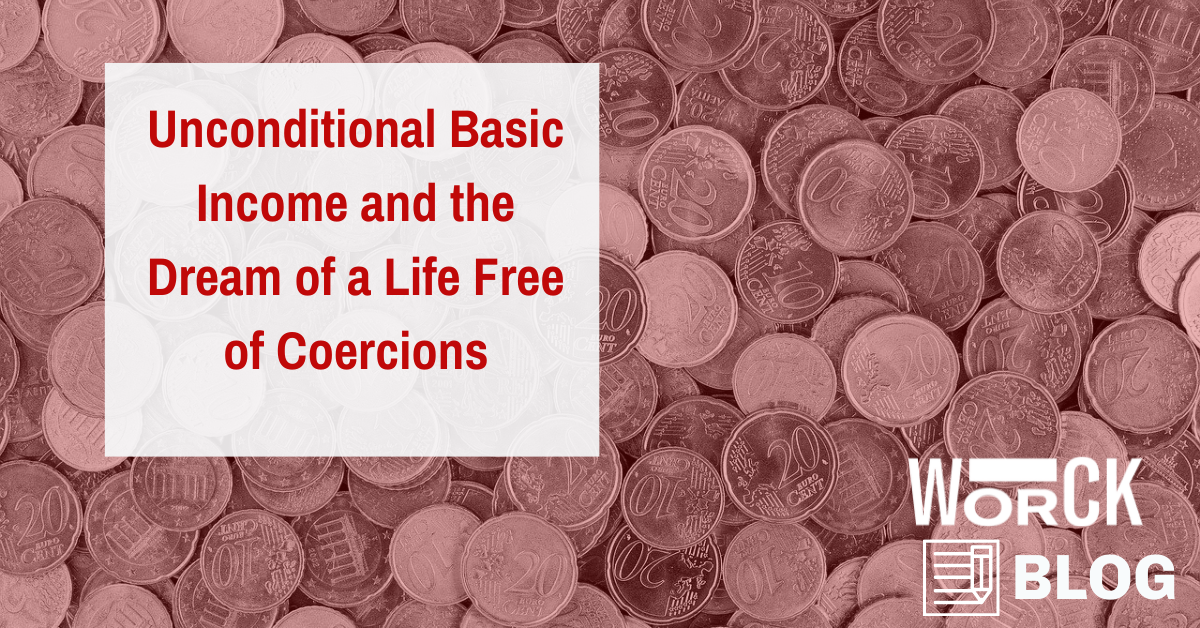Unconditional Basic Income is often mentioned as a means to resolve at least part of the income problems for a significant number of people during the COVID-lockdown. There are manifold proposals, including the temporary introduction of an UBI scheme for all or part of the society. However, despite this wave of well-intended proposals, it is clear that there is a lack of an in-depth understanding of what an unconditional Basic Income really is. Even though it would be a valuable instrument, in this time of crisis to secure a decent minimal standard of living, the main characteristics should not be conceived for use in a crisis, but for everyday life.
By Albert Jörimann (former President of the “Basic Income Earth Network” B.I.E.N. Switzerland, Geneva)

Unconditional Basic Income is often mentioned as a means to resolve at least part of the income problems for a significant number of people during the COVID-lockdown. There are manifold proposals, including the temporary introduction of an UBI scheme for all or part of the society. However, despite this wave of well-intended proposals, it is clear that there is a lack of an in-depth understanding of what an unconditional Basic Income really is. Even though it would be a valuable instrument, in this time of crisis to secure a decent minimal standard of living, the main characteristics should not be conceived for use in a crisis, but for everyday life.
Critical minds, like Clare Foges in «The Times» of April 13th, have not only understood this, but immediately captured the main weakness of the scheme with a beautiful metaphor: «Like picking a pretty flower from the ground and drawing out with it a long, ugly and mud-clodded root, embracing the benign-sounding prospect of universal basic income would open the way to an undesirable future, where large numbers are paid to simply exist, without work or any prospect of it» (cited from Jonathan Fisher’s Twitter feed). But let us have a less botanical look at the proposal.
In the Basic Income debate of 1995, it was by no means accidental that Philippe van Parijs entitled his most influential book „Real Freedom for All“ (with the subtitle „What, if anything, can justify Capitalism?“). Everyone immediately understands that this real freedom is freedom from the need to work, which in a capitalist society is in general how one earns income. A basic income is one which is sufficient to live on in a decent way, is for every person individually, independent of their age, sex, marital status, religious belief and convictions, is without the obligation to pay contributions to some insurance scheme and without the obligation to foster some kind of trade-off, such as work. Such a perspective indeed opens the horizon to a lifelong state of idleness, if this is what is to be understood under real freedom.
Every Persons’ Minimal Share of the Wealth of the Nation
It is hard to believe that van Parijs spent half a year on this book (and most of his adult life) to value idleness. Obviously, this is not what Basic Income is about, even if the option of a life according to the principles of Diogenes and Dionysus appears not unattractive at all, and not only at the first glance. But this is not its main goal. The most important aim of an Unconditional Basic Income is to provide everybody and anybody with the means to live at least a modest life, free from charges and obligations. The Basic Income grants to every individual a certain basic share (modest or minimal according to your politics) in the wealth of the nation. As such, it has nothing to do with welfare and is not an amendment to social security, as many supporters believe. In some ways they are right of course, in that the first beneficiaries of Basic Income would tend to be the men and women at the low end of the income scale. Basic Income, being sufficient to cover the basic needs of every single person and grant a decent life to everybody, would become a measure to combat – even better, to set an end to – poverty for all time. But this is not the core of the scheme. Poverty can be abolished without the introduction of a Basic Income scheme (and has indeed been abolished to a large degree in those states that call themselves civilized precisely because (amongst other things) of having abolished poverty). The core is that Basic Income assures every citizen, indeed every inhabitant of a country, an entitlement to the amount that corresponds in financial terms to their right to life. It is the basic right of every person, not an entitlement to some welfare benefits. It is as much part of one’s civil rights as for example, voting rights or the freedom of opinion. This is why it goes to billionnaires as well as to the homeless (who should, by means of a Basic Income, be capable of finding shelter, being also part of basic human rights).
Abolishing Absolute Dependency on Earned Income
One of the secondary effects of Basic Income (which for some supporters, ranks at the top of the arguments) is the abolition of the absolute dependency on earned income, including the systems of social insurance which are tied to it. This indeed is an emancipatory step for a society whose organization and instruments of creating wealth are based on alienated, combined work under capitalist conditions. The paramount importance of salaried labour in such a society cannot be over-estimated. It not only creates fortunes for the owners of the productive apparatus, but also provides the means of living for generations of workers and employees. And, as the most important expression of its significance, it has also been stylized into a common identity and self-esteem of the modern individual as pertaining to the working class (no matter what kind of work it assumes and what political conclusions one would draw from the fact of being a salaryman). Salaried labour consumes a good quarter of the lifetime of an average employed person, which gives an impression of the significance of the complex for the average human being: one cannot survive without integrating such a paramount parameter in one way or the other into the personality, character and psyche, individually or via the collectivity of workers.
Over the course of time and with the transformation of our capitalist society into a consumption rather than producing society, not only have salaries risen out of all proportion with regard to purchasing power, but also the character of the salaried activity has evolved. The repetitive mechanical, robotic activities have mainly disappeared, giving place to jobs requiring more or less high skills or services, while former elitist jobs, for example those in engineering, jurisprudence, teaching etc., have been transformed into normal salaried activities.
For the salaried workforce who earn money doing more or less regular jobs, there is no alternative but to spend their lifetime as employees, tied to their enterprise (or various enterprises) during their lifetime, being subject to the moods and tempers of both superiors and colleagues. The normality of working conditions has become much more appealing, challenging and satisfying, but the fact that it is alienated and combined labour, remains in full force.
Basic Income between National Legislation and Human Right
I am not speaking here of those jobs that have survived the change of times, whose activities are dirty and dangerous, often ill-paid, if not illegal and scarcely subject to the protection of the laws of the welfare state. These have to be terminated by means other than the introduction of a Basic Income, even if Basic Income can provide some minimal guarantees for those concerned. In reality, these workers are often immigrants with a precarious legal status or no legal status at all, which allows me the hint of Basic Income being tied to national legislation, while it is, at least in theory, a part of general human rights. This hint shows that the introduction of a Basic Income scheme would not resolve all problems arising within the macro- and micro-cosmos of salaried work at all.
The introduction of a fully fledged Basic Income scheme would by no means drive normal people with normally paid jobs (that is, with salaries substantially higher than the Basic Income) into idleness or let them lose any self-esteem and purpose. And obviously it is not the Basic Income that would, after its introduction, let live large numbers of persons without work or the prospect of it, as Clare Foges writes, but it is the permanent technological change that drives people out of traditional jobs and activities, as for instance mining or the classical production line that have disappeared in our countries 40 years ago; nowadays, we are in the middle of a new revolution with 5G on-site tracking and tracing, the terminal phase of digitalization, homeworking, home delivery. Miraculously and sometimes as a consequence of the political will of the societies, new possibilities to earn money evolve, new activities arise, as new desires are evolving as well that can be satisfied and start to create value. This has got nothing to do with the Unconditional Basic Income. On the other hand, such a scheme provides a basic stability in those transformation phases. And furthermore, it could very well impact those people who have to work senseless amounts of hours every week because of the miserable wages they earn. They might well be tempted to abandon such jobs, exactly because of their lack of purpose. We might add that these people often belong to the discriminated class of immigrants, sometimes even illegal residents, who try to support their families abroad with small contributions and remittances they can eke out of their tiny income. Those would not stop working under precarious conditions, but would send home the extra money earned out of the Basic Income.
More relevant for a static discussion on the respective national levels, are those regions where people have been jobless for years, if not for generations. We know such regions exist, for example in Southern Italy, in England and in Belgium. Here, the lack of purpose and perspective is omnipresent and would not be altered with the introduction of a Basic Income. To tackle such situations would be one of the primary objectives of a civilized state and society, and it is exactly their success in tackling them that is an important measure of their civility.
The characteristics of salaried work have dramatically changed – not for all jobs, but for the large majority. As I have said, although the activity as such has become much more suitable to the worker, it still is impregnated by various coercions. And it is also subject to several changes of perspectives. During large periods of the 20thcentury, and in those periods without war, a job used to have a perspective per se; it was considered safe and lifelong. Nowadays, not only has the durability vanished, but other aspects have been introduced – amongst others the career promises as a very prominent form of a contemporary perspective. This kind of perspective crashes at some point in the career for practically everybody. Perspectives and purposes do not remain the same when everything else changes.
Some supporter of the Basic Income do indeed dream of a life absolutely free of external coercions, as they are part for instance of any working contract. Yet, the concept of such an absolute freedom appears fragile, since there is no absolute autonomy for the individual. The discussion of these matters must take place in other forums.
If you would like to contribute to this debate, please send your blog text to worck@worck.eu.
